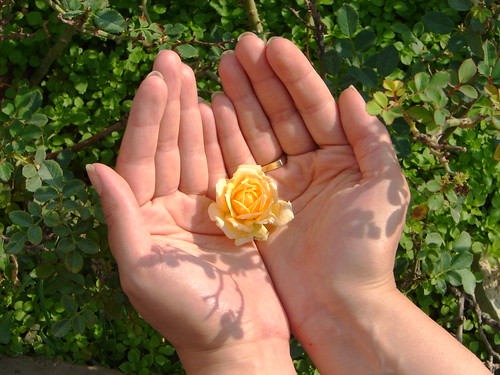What I Have Learned So Far
by Mary OliverOriginal Language English
Meditation is old and honorable, so why should I
not sit, every morning of my life, on the hillside,
looking into the shining world? Because, properly
attended to, delight, as well as havoc, is suggestion.
Can one be passionate about the just, the
ideal, the sublime, and the holy, and yet commit
to no labor in its cause? I don't think so.
All summations have a beginning, all effect has a
story, all kindness begins with the sown seed.
Thought buds toward radiance. The gospel of
light is the crossroads of -- indolence, or action.
Be ignited, or be gone.
| -- from New and Selected Poems, by Mary Oliver |
<<Previous Poem | More Poems by Mary Oliver | Next Poem >>

/ Image by Hamed Saber /
This, to me, is an interesting poem, the way it wrestles with that age-old question of spirituality: faith or works, jnana or karma... or, as she bluntly frames it, indolence or action.
Does the seeking of wisdom lead one into such an internalized state that one abandons the world to its confusion and suffering? Even when we awaken profound compassion within ourselves, is compassion enough without action to back it up? Ultimately the question boils down to, is enlightenment a good in and of itself, or does it only fulfill itself through service?
Different traditions and teachers give us different answers. Many teachers will say that trying to "do good" without first achieving some measure of inner clarity cannot achieve its full potential. Some even say that spiritual opening has a natural resonance; the enlightened are like radio transmitters, apparently doing little, apparently silent, they broadcasting powerful waves into the world. There is even an argument action, no matter good intentioned, is meaningless and unstable without true insight, while there can be apparent inaction that shakes the universe.
Others say that spirituality and compassion without heartful action is anemic at best, that the physical and social world are themselves part of our spiritual landscape, that we must embody our spirituality on that level too. This criticism can go so far as to say that spirituality in a cave is easy, spirituality in the world is hard; that's where we truly prove our awakening love. They argue that action always exists, even the avoidance of action is action. One must always seek to express the inner state with outer action. And for the spiritually minded, that action must be in the form of compassionate service to a struggling world.
Mary Oliver seems to finally favor the latter philosophy:
Can one be passionate about the just, the
ideal, the sublime, and the holy, and yet commit
to no labor in its cause? I don't think so.
Me? I have a fiery nature, and I like a statement like Mary Oliver's. I see too much passivity in good-hearted people, myself included sometimes.
But I don't ultimately see a great conflict with any of these philosophies. The universe is a big universe, with endless pathways for the human spirit to travel. The more we release our enlightened selves, the more we naturally embody who we naturally are.
For some, that resolves itself into a profound stillness that is outer as well as inner. And do they not ring out from their mountaintops and closets? Do we not, on some level, hear them and ring out a little more ourselves?
For others, stillness and love seeks a pathway of expression through action and service. The way they use the same two hands we all possess -- doesn't it make our own fingers itch for their own movement?
Recommended Books: Mary Oliver
| New and Selected Poems | Why I Wake Early | Dream Work | House of Light | Thirst: Poems |
| More Books >> | ||||

